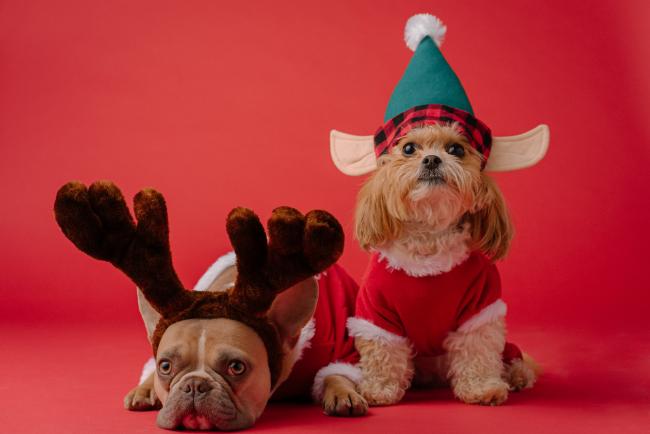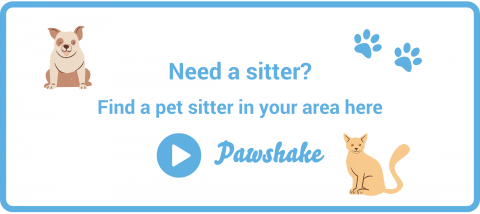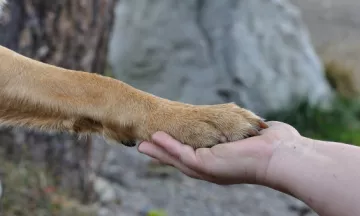Tis the Season, but Not for Sharing: The Perils of feeding Christmas Ham under the table
As the holiday season draws near, we humans begin to prepare our seasonal holiday feasts. While sharing is the reason for the season, pet owners must exercise caution when sharing from the Christmas dinner table. See here which treats are safe and what is not safe to feed to your dog & cat!

Christmas Chocolate: The Theobromine Threat
Pet owners should be aware that chocolate contains theobromine, a substance toxic to dogs and cats. The darker and richer the chocolate, the higher the theobromine content. To ensure the safety of your furry friends, keep those festive treats out of reach.
A stimulant in cocoa beans, theobromine affects pets differently based on their size and the type of chocolate consumed. Dark chocolate has a higher theobromine concentration, making it more hazardous.
In small amounts, theobromine can cause symptoms such as restlessness and shivering. Large amounts may lead to more severe issues such as vomiting, diarrhea, rapid breathing and increased heart rate. In some extreme cases, it can cause seizures or death.
Recognising the signs early and seeking immediate veterinary attention is crucial in mitigating the risks associated with chocolate toxicity. The symptoms to keep an eye on include restlessness, shivering, vomiting, panting, excessive drinking or urination. Please contact your vet if your pet displays any of these symptoms.
Grapes and Sultanas: A Recipe for Kidney Woes
Grapes and sultanas are popular in many holiday recipes. Unfortunately, this makes them potential hazards during Christmas lunches and dinners. Pets can suffer from acute renal failure or kidney damage even with a bite sized amount.
Current research suggests that the tartaric acid present in grapes is the culprit. Tartaric acid concentration differs from grape to grape depending on variety, growth conditions and ripeness. It is important to understand that a pet may appear fine after eating one grape as an occasional treat. However, consuming the next grape could cause them to become seriously ill.
The uncertain nature of how your pet will react means there is currently no established safe threshold for these fruit.

Allium Alarm: Onion and Garlic Dangers
Garlic, onions, leeks, and spring onions enhance the taste of many human dishes served during Christmas dinners. However, these ingredients are not safe for cats and dogs to eat and pose a significant risk to your pet's red blood cells.
Allium plants contain compounds that can be highly toxic to pets. These compounds can damage your pets red blood cells, making them more likely to rupture. In severe cases, it can lead to a life-threatening condition known as hemolytic anemia. The effects of allium toxicity may have a delayed onset, making it important for pet owners to be vigilant.
The severity of the reaction varies based on the type of allium, its form (raw or cooked), and the amount ingested. Certain species of dog and cats in general are much more sensitive to alliums. So even small quantities, or concentrated forms like onion powder, they can have detrimental effects on a pet's health. To ensure the safety of your furry friends, refrain from sharing any dishes containing alliums during Christmas dinners.
Symptoms to watch for include lethargy, lack of appetite, rapid breathing, and an increased heartbeat. If you suspect your pet has consumed these ingredients, seek immediate veterinary assistance to ensure their well-being.
Tempting Treats: Navigating Vicious Veggies
We argue with our children about eating vegetables. However, we must also be cautious that they don't secretly feed them under the table, as they are not part of a dogs diet. Tomatoes, peppers, avocado, and eggplant can all pose risks to our pets and their digestive systems.
Tomatoes and peppers contain substances like solanine. This can cause stomach upset and, in severe cases, more significant issues including heart problems and difficulty breathing. Avocado contains persin, a compound that can be toxic to many animals, including dogs and cats.
Eggplant, another staple, also contains solanine and other toxic alkaloids. The concentrations may not be lethal in small amounts, but cumulative exposure over time can lead to complications. Understanding the specific risks associated with these vegetables empowers pet owners to make informed decisions.

Nut Warnings: Macadamias, Walnuts, and the Pitfalls of Peanuts
Nuts are a common inclusion in many festive recipes and treats during Christmas dinners. However, most nuts pose risks for dogs, with macadamias and walnuts standing out as particular threats.
Peanuts are safe in small amounts. However, pet owners should avoid giving them too much peanut butter. Peanut butter has a high fat content and can cause an upset stomach. Keep an eye out for hidden nuts in holiday dishes and treats to ensure the safety of your pets.
Sweet Dangers: Xylitol, Salt, and Alcohol
Many holiday sweets may also contain xylitol. Xylitol is a sugar substitute known to be extremely toxic to pets. You should especially look out for sweet treats labeled 'light,' as they are more likely to contain it.
This artificial sweetener can be in a wide range of sweets, including lollies, ice-cream, gum and many sugar-free products. As well as some of these products being a choking hazard, the xylitol can lead to insulin release in dogs. This causes a rapid decrease in blood sugar levels.
Excessive salt intake from well-seasoned human holiday treats can result in salt poisoning for pets. This manifests in symptoms such as vomiting, restlessness, and in severe cases, seizures.
Finally - it is always essential to keep pets away from all forms of alcohol. This includes alcoholic beverages, cleaning products and cosmetics. It can have severe health consequences, including respiratory failure, seizures, and even death. The RSCPA recommends contacting your vet immediately for advice if you suspect your pet has ingested alcohol.
Lactose Perils: Dairy Roulette
Many traditional holiday sweets and goodies such as eggnog and puddings may contain dairy products. We must recognise, that just like their human owners, our furry friends may also be lactose intolerant.
Lactose, a sugar found in milk and dairy products, can be challenging for some pets to digest. Ingesting lactose can lead to digestive issues, including stomach upset, diarrhea, and discomfort.
So while they may be ok to give in small portions, opting for lactose-free alternatives is a safer bet. If your pet does consume dairy and show any symptoms - please contact your vet

Safe Celebrations: Healthy Alternatives for Your Pets
Remember, there are many safe treats for your pet to enjoy and feel included during the holiday season.
Having some pet-friendly snacks on-hand over the festivities will mean that your pet doesn't need to feel left out on Christmas Day. You don't need to go and spend a great deal either to accomplish this either.
Lean, unseasoned proteins such as chicken, beef, and fish are a perfectly safe for dogs and cats to eat. They also provide some festive variety.
Additionally, your local vet or pet food supplier will have an array of nutritionally balanced treats and snacks. If ensuring your pet has all the vitamins and minerals they need is a priority, this may be an option to look at.
Need someone to help ensure your furry friend gets their Christmas feed? Book a Pawshake sitter today!






